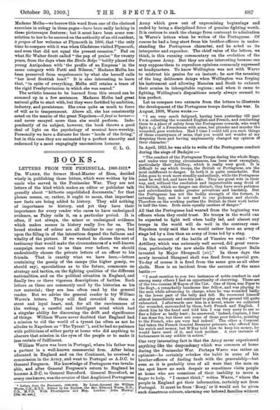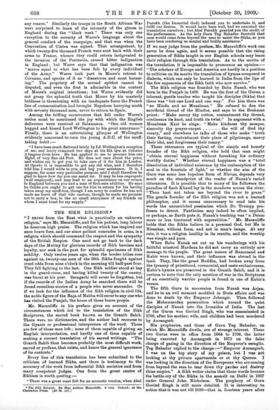BOOKS.
LETTERS FROM THE PENINSULA, 1808-1812.* Dn. WARRE, the former Head-Master of Eton, decided wisely in publishing these letters, which were written by his uncle who served in the Peninsular War. They are not letters of the kind which makes an editor or publisher talk grandly about "hitherto unpublished documents," for that phrase means, or, rather, it ought to mean, that important new facts are being added to history. They add nothing of importance to history, and yet they have their importance for every reader who cares to have undesigned evidence, as Paley calls it, on a particular period. It is often, if not always, the minor or undesigned evidence which makes scenes in history really live for us. The broad strokes of colour are all familiar to our eyes, but upon the filling in of the interstices depend the fullness and vitality of the picture. If we wanted to choose the sort of testimony that would make the circumstances of a well-known campaign more real to us than ever before, we should undoubtedly choose the private letters of an officer to his friends. That is exactly what we have here,—letters containing the gossip of the camps (the higher gossip, we should say), speculations as to the future, comments on strategy and tactics, on the fighting qualities of the different nationalities, and on the political situation in England, and finally two or three vigorous descriptions of battles. Such letters as these are commonly used by the historian as his raw material; they are less often read by the general reader. But we advise the general reader to try William Warre's letters. They will find revealed in them a stout and loyal heart, and, for all the carelessness of the writing, a careful and intelligent mind which had a singular ability for discerning the drift and significance of things. William Warre never doubted that England had a mission to rid the world of a tyrant (as often as not he alludes to Napoleon as "The Tyrant "), and he had no patience with politicians of either party at home who did anything to obscure that mission in the eyes of the people or to make it less certain of fulfilment.
William Warre was born in Portugal, where his father was a, partner in a well-known commercial firm. After being educated in England and on the Continent, he received a commission in the Army, and went to Portugal as A.D.C. to General Ferguson. His knowledge of Portuguese was invalu- able, and after General Ferguson's return to England he became A.D.C. to General Beresford. General Beresford, as every one knows, was the creator of that Anglicised Portuguese • Letters from the Peninsula, 1508-1812. By Lieut.-General Sir William Warm, C.B., R.T.S. Edited by his nephew, the Bev. Edmond Warre, D.D., C.B., M.V.O. With Frontispiece and Map. London ; John Murray. [10s..6d. set.]
Army which grew out of unpromising beginnings and ended by being a disciplined force of genuine fighting worth. It is curious to mark the change from contempt to admiration in Warre's letters when he writes of the Portuguese. Of course he had a long start from his brother-officers in under- standing the Portuguese character, and he acted as its interpreter and expositor. The chief value of the letters, we think, is this running commentary on the evolution of the Portuguese Army. But they are also interesting because one may suppose them to reproduce opinions commonly expressed at headquarters. To know Wellington was not with Warre to mistrust his genius for an instant ; he saw the meaning of the long deliberate delays when Wellington was forging his instrument and allowing Massena and Soult to exhaust their armies in inhospitable regions ; and when it came to fighting, Wellington's dispositions nearly always seemed to him perfect.
Let us compare two extracts from the letters to illustrate the development of the Portuguese troops during the war. In August, 1808, Warre wrote :—
"I am very much fatigued, having been yesterday till past 5 P.M. collecting the wounded English and French, and conducting them to a place of safety from the Portuguese cowards, who won't fight a A of a Frenchman with arms, but plunder and murder the wounded, poor wretches. Had I time I could tell you such things of these countrymen of mine, that you would not wonder at my despising them and having unpleasantly changed my opinion of their character."
In April, 1812, he was able to write of the Portuguese conduct during the siege of Badajoz :— "The conduct of the Portuguese Troops during the whole Siege, and under very trying circumstances, has been most exemplary, particularly their Artillery, which is really very good. It is difficult to say which troops, the British or Portuguese, are the most indifferent to danger. In both it is quite remarkable. But John goes to work more steadily and sullenly, while the Portuguese must be well led, and have his joke. They are great wits in their way, and, without the resolution and impenetrable sang froid of the British, which no danger can disturb, they have more patience and subordination under greater privations and hardship. But the Portuguese has not the bodily strength of the former, is naturally lazy, and is not used to our pickaxes and shovels. Therefore on the working parties the British do their work better in half the time. Both seem equally careless of danger."
All that the Portuguese had wanted from the beginning was officers whom they could trust. No troops in the world can be expected to fight well when badly led, and almost any troops in the world will do well in the contrary case. Napoleon truly said that he would rather have an army of stags led by a lion than an army of lions led by a stag.
In the account of the battle .of Vimeiro we read : "Our Artillery, which was extremely well served, did great execu- tion, particularly the new shells filled with Musquet Balls
invented by Major Sbrapnell [sic]." In those days the newly invented Shrapnel shell was fired from a special gun.
To-day of course it is fired from the same gun as all other shells. Here is an incident from the account of the same battle :—
" I must mention to you two instances of noble conduct in and among many others I had an opportunity of observing. These are of the two cousins 31`Kayes of the 71st. One of them was Piper to the Regt., a remarkably handsome fine fellow, and was playing to the men while advancing to charge, when he was wounded badly in the lower part of the belly and fell. He recovered himself almost immediately and continued to play on the ground till quite exhausted. I afterwards saw him in a hovel, where we collected the wounded, surrounded by them, both French and English. I shook him by the hand and told him I was very sorry to see so fine a fellow so badly hurt ; he answered, Indeed, Captain, I fear I am done for, but there are some of these poor fellows, pointing to the French, who are very bad indeed.' The other a Corporal had taken the French General Brennier prisoner, who offered him his watch and money, but AVICay told him to keep his money, he would have need of it, and took neither. A rare instance of forbearance in any soldier in action."
One very interesting fact is that the Army never experienced anything like the despondency which was common at home during the Peninsular War. Perhaps Warre was rather an optimist—he certainly rebukes the habit in some of his brother-officers of finding fault with the generalship—but even so it is probably true of all wars that the men on the spot know no such despair as sometimes visits people at borne who are conscious of their inability to move a finger to help. "I cannot think," writes Warre, "where the people in England get their information, certainly not from Portugal. It must be from 'Bony,' or it would not be given such disastrous colours, alarming our beloved families without
any reason." Similarly the troops in the South African War
were surprised to learn of the intensity of the gloom in England during the "black week" There was only one exception to the serenity of Warre's language about the
general conduct of the campaign, and that was -when the Convention of Cintra was signed. That arrangement, by which twenty-five thousand French were sent back with their arms to France, whence they could return invigorated to the invasion of the Peninsula, caused bitter indignation in England ; but Warre says that that indignation was "scarce equal to what has been felt by every individual of the Army." Warre took part in Moore's retreat to Corunna, and speaks of it as "disastrous and most harass- ing." The propriety of the second epithet cannot be disputed, and even the first is admissible in the context of Moore's original intentions ; but Warre evidently did not grasp the splendid truth that Moore by his masterly boldness in threatening with an inadequate force the French line of communication had brought Napoleon hurrying north with seventy thousand men, never to return to Spain.
Among the trifling occurrences that fell under Warre's notice must be mentioned the joy with which the English deliverers were received at Salamanca. "One old woman hugged and kissed Lord Wellington to his great annoyance."
Finally, there is an entertaining glimpse of Wellington evidently concerned to cure the young A.D.C. of the snuff- taking habit :—
"I have been much flattered lately by Ld. Wellington's reception of me, and lately remained two days at his lid. Qrs. at Celorico 2 leagues from here. He has applied to me to procure him one Hghd. of very fine old Port. He does not care about the price, and wishes me to get you to take care of it for him in London. At Oporto it is impossible to get any old wine, and I therefore told him I would write to you, and beg your assistance. It is, I suppose, for some very particular purpose, and I shall therefore be glad to know how far you can assist me. It may be bem empregado (well employed), and may lead to an acquaintance on our return to England between you and a man of first-rate abilities. He says he thinks you ought to get one for him in return for his having taken away my snuff-box, though I am sorry to confess he has not made me leave off that vile custom, though he made me promise not to carry a box, to the no small annoyance of my friends on whom I must trust for my supply."











































 Previous page
Previous page